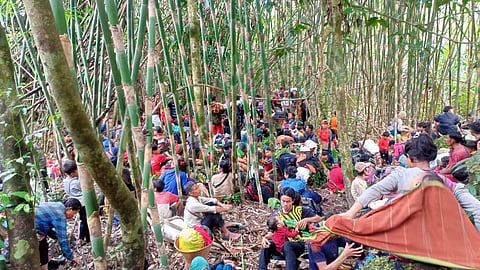

GUWAHATI: Bawilianthang walked for three days, slept in the jungle and starved until he swam to safety at Bonduk-bangsora, the non-descript village in Mizoram near the tri-junction of Bangladesh, Myanmar and India on November 20.
Bawilianthang, is in his early sixties. He fled to Mizoram along with his wife and two sons. He and his family are among 272 Kuki-Chin people, who fled their homes in the Chittagong Hill Tracts of Bangladesh in the face of a conflict between the Bangladesh Army and an ethnic armed group. They are now taking refuge at the Parva village in Mizoram.
"We are from seven villages who met in the jungle. We had nothing to eat and survived by drinking water from the streams. We slept two nights in the jungle. The children, elderly people and patients suffered the most. But luckily, none of us was bitten by snakes or attacked by wild animals," Bawilianthang told The New Indian Express in fluent Bengali.
He said the villagers hardly got time to carry foodstuffs or valuables in the face of the offensive against the Kuki-Chin National Army (KNA) by the Bangladesh Army, which allegedly took the help of Myanmar's largest insurgent group Arakan Army.
The conflict has its genesis in the KNA's demand for autonomy for the Kuki-Chin people. They and the Mizos belong to the Zo community and share the same culture and ancestry.
"The operation against the KNA started about a month ago. The Bangladesh Army and the Arakan Army raided one village after another and beat up and arrested our people. Some were sent to jail. They threatened to kill us. Many of our people are missing. We did not feel safe and fled," Bawilianthang said.
He said they also faced socio-economic boycott by the Bangladeshi people.
"We grow turmeric, ginger, yam, mangoes, pineapples etc. We used to sell them in the markets but the Bangladeshi people refused to buy from us. They also refused to sell goods, including essential items, to us while the Bangladesh Army prevented us from going from one village to another," the farmer said.
The refugees are lodged at a school, a church and a community hall in Mizoram. They cook their food with ration being provided by the locals. The villagers also provided them with warm clothes.
"There are some patients among us. A doctor visited us yesterday (Wednesday) and gave medicines. We don't know if we can ever return to our villages. We stare at a bleak future," Bawilianthang said.
The Parva village council president Gosapela said the villagers were doing all that possible to help the refugees. "This is a humanitarian crisis. We are doing as much as we can afford," he said.
As the conflict in Bangladesh continues, Khuma Bawm, a member of the newly-formed Bangladesh Refugee Committee in Mizoram, said more people might arrive in the next few days.
The Mizoram government has decided to extend humanitarian aid to the refugees. The decision was made at a meeting which Chief Minister Zoramthanga chaired.
Amol Srivastava, District Magistrate of Lawngtlai, where the refugees are lodged, asked the sub-divisional officer of Chawngte in the district to relocate some asylum seekers to Chamdur Project, Mautlang and Hmawngbu villages as more people were expected to come.
"It is observed that accommodation at Parva III has become a concern for the asylum seekers and more are expected to come... You are thus required to coordinate with the VCs (village councils) of the respective villages and the Mizoram Bawm Students' Association for necessary arrangements," DM Srivastava wrote in a notification.
The influx comes at a time when the state government is grappling with over 30,000 Chin refugees, including lawmakers, from Myanmar. They had entered Mizoram over a period of time in the aftermath of the coup by Myanmar military in February last year.